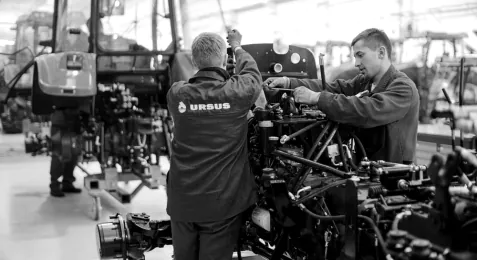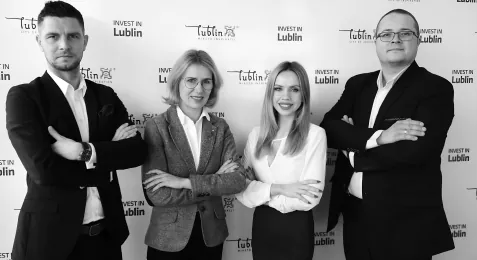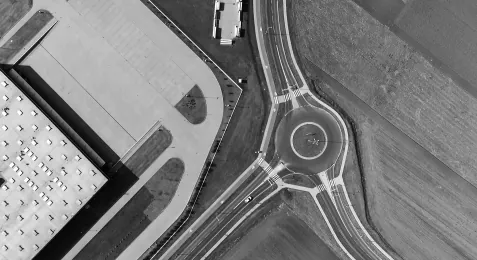Lublin Info Centre
Lublin launches Industry Skills Center to train robotics technicians

Robotics is undoubtedly a profession of the future, already enjoying immense demand across various industries and sectors of the economy. On the other hand, Vocational Skills Centers are a new type of educational institution that significantly exceeds the existing frameworks of vocational education and training. Therefore, in partnership with the Polish Forum of Automation and Robotics, we decided to implement a joint venture that combines robotics with modern education. We hope that the BCU offer at the Transport and Communications School Complex will be attractive not only for students, graduates, and teachers but also for anyone interested in their personal development and enhancing their vocational qualifications, says Krzysztof Żuk, the Mayor of Lublin.
The signed partnership agreement involves the joint implementation of the project “Establishment and operation of the Vocational Skills Center in the field of robotics at the Transport and Communications School Complex named after Tadeusz Kościuszko in Lublin.” The main goal is to create and support the functioning of a facility aimed at students of vocational schools, university students, vocational teachers, industry employees looking to update their knowledge and qualifications, and individuals wishing to retrain.

As part of the BCU establishment, part of the existing workshops in the ZSTK building will be renovated for practical vocational training. Five specialized workshops will be created and equipped: a cobotic workshop, two robotic workshops with industrial robots, a VR workshop, and an educational robot workshop, including equipment and software for creating educational materials. In addition, the Vocational Skills Center will receive support through educational and training activities, primarily vocational training for students and university students in programming cobots, beginner-level programming of industrial robots, operating and programming autonomous robots (AMR), as well as 3D modeling and operating 3D printers. It is also planned to conduct vocational training for adults in operating and servicing industrial robots – a course for Maintenance Staff and a course for Integrators, as well as vocational training for vocational education teachers. The project is expected to include a minimum of 200 participants, including 120 adults who are not vocational education teachers, 60 young individuals, and 20 vocational education teachers.
The offer of Vocational Skills Centers is characterized by a nationwide scope, specialization in a specific vocational field, and a structural link to a nationwide industry organization relevant to that field. Meanwhile, robotics currently has numerous applications in various industries for automating technological processes, such as in the automotive, food, pharmaceutical, and electronics sectors; in service companies offering robotics-based solutions, such as in logistics, transportation, medicine, education, or entertainment; and in research and development companies creating new technologies and innovations related to robotics, including artificial intelligence, mechatronics, biomedical engineering, and astronautics. Robotics technicians are specialists who design, build, program, and operate robots.
This is the second facility of a similar nature in Lublin. In January 2024, a Vocational Skills Center in the field of construction was established at the State Schools of Construction and Geodesy named after Hieronim Łopaciński, in partnership with the Lublin Municipal Government and the Polish Housing Association. The facility is an important component of the so-called triangle of knowledge: school-university-employers in the development of the construction industry.
The opening of the Vocational Skills Center in the field of robotics is planned for January 2025, with project implementation expected by June 30, 2026. The total value of the project will amount to PLN 13.5 million net.


The undertaking includes:
- The establishment and operation of the Vocational Skills Center in the field of Robotics at the Transport and Communications School Complex named after Tadeusz Kościuszko in Lublin, involving:
a) Renovation of part of the existing workshops in the school building to be used for practical vocational training for the BCU;
b) Equipping 5 specialized BCU workshops: a cobotic workshop, 2 robotic workshops with industrial robots, a VR workshop, and an educational robot workshop;
c) Purchasing equipment necessary for the BCU’s operation (including the purchase of equipment and software for creating educational materials and furnishing the BCU office);
- Supporting the functioning of the Vocational Skills Center through the implementation of activities in the following areas:
a) Educational and training activities:
- Vocational training for students in:
- Programming cobots,
- Programming industrial robots for beginners,
- Operating and programming autonomous robots (AMR),
- 3D modeling and operating 3D printers.
- Vocational training for university students in:
- Programming cobots,
- Programming industrial robots for beginners,
- Operating and programming autonomous robots (AMR).
- Vocational training for adults in:
- Programming cobots,
- Operating and servicing industrial robots – course for Maintenance Staff,
- Operating and programming industrial robots – course for Integrators.
- Vocational training for vocational education teachers in:
- Programming cobots,
- Programming industrial robots for beginners,
- Operating and programming autonomous robots (AMR),
- 3D modeling and operating 3D printers.
- Non-formal education course (sectoral) on robot fleet management.
- Additional classes for students:
- Basics of robotics,
- Assembly of robotics devices and systems,
- Start-up of robotics devices and systems,
- Operation of robotics devices and systems,
- Programming of robotics devices and systems,
- Exploitation of robotics devices and systems,
- Diagnostics and maintenance of robotics devices and systems,
b) Activities to integrate and support cooperation between schools and universities with employers;
c) Innovative and developmental activities increasing the transfer of knowledge and new technologies in the field of robotics to schools and universities, as well as promoting ecological and digital transformation;
d) Advisory and promotional activities;
e) Organizing thematic tournaments for students of vocational schools related to the field of robotics and collaborating with institutes and research centers, including the development of skills in robotics.
- Vocational training for students in:






